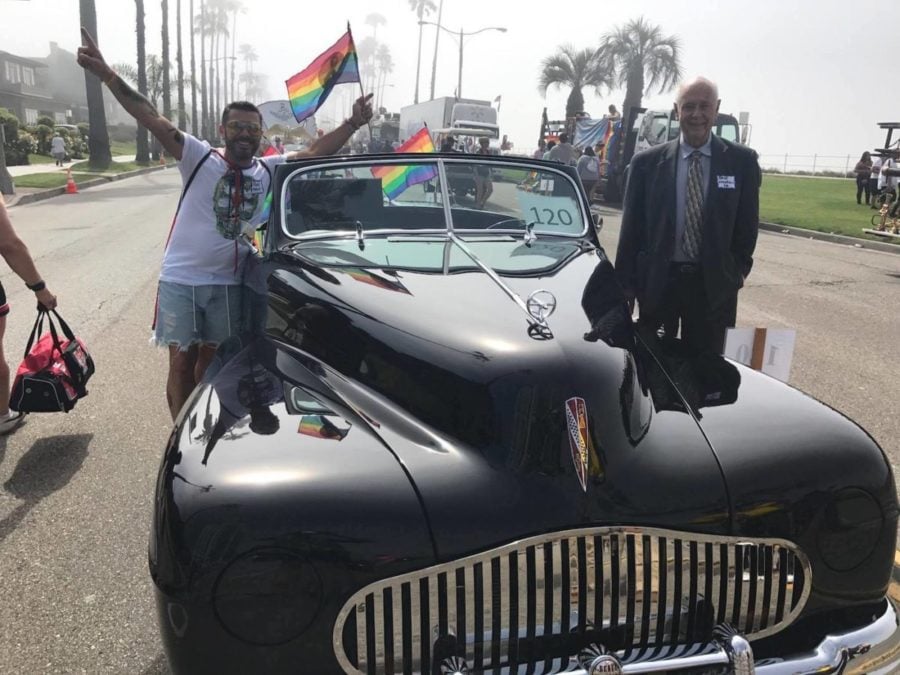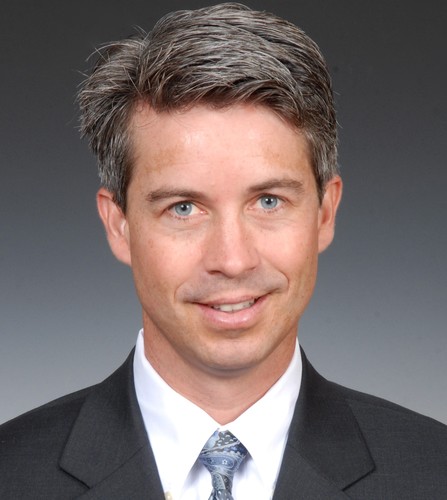
Rory Moroney, left, and his attorney Bruce Nickerson, ride in the Long Beach Pride Parade May 21, 2017. Photo: Rory Moroney.
(For June, which is designated LGBTQ Pride Month, Q Voice News featured a series of interviews and first person essays under the theme What Pride Means to Me. Pride is more than one month a year, and we have extended the series, which launched last year. Check out 2019’s essays on What Pride Means to Me.)
LONG BEACH — For many LGBTQ people, Pride is a celebration of the Stonewall riots.
But just as Stonewall didn’t start the LGBTQ Civil Rights Movement that had been ongoing for quite sometime (The Black Cat rebellion in Silver Lake and Lee Glaze’s “Flower Power” protest at The Patch bar in Wilmington are two events that preceded Stonewall and deserve the same recognition), George Floyd’s murder didn’t start the movement for racial justice and equality.
George Floyd’s murder
Floyd’s death didn’t start the Black Lives Matter movement, but it served as a catalyst for more people to pay attention to these grievous injustices and galvanized massive protests against police brutality.
George Floyd never got his day in court, a day that we are all promised if we are arrested and charged with breaking the law.
I had my day in court, and I had the opportunity to prove my innocence against the Long Beach Police Department.
My wonderful, legal dream team of Bruce Nickserson and Stephanie Loftin proved that the Long Beach police officers who arrested me acted not in the public interest, but in the interests of their own prejudices and discriminated against gay men when they targeted them for these false arrests.
I was arrested in October 2014 at a public restroom in Recreation Park in East Long Beach and booked for indecent exposure and lewd conduct.
Attorney Bruce Nickerson has spent decades defending gay men falsely accused of lewd conduct
Long Beach police target gay men
An undercover police officer, Det. Raymond Arcala, followed me into the restroom and acted as a decoy for the sole purpose of arresting me.
I was surprised to find out later that three other undercover police officers were “waiting in hate” for their prey to arrive. One was allowed to do the dirty work.
Arcala’s “cruising skills” were good. He made eye contact with me and then nodded his head and raised his eyebrows. These non-verbal, flirtatious gestures and body language indicated he was interested in hooking up. Arcala also had his hand under his shirt near his waist, which gave the impression he grabbed his crotch.
I reciprocated his advances. I exposed and simultaneously grabbed myself.
The arrest
Arcala knew exactly what he was doing and what his mission was — and he accomplished it. After I exposed myself, Arcala left the bathroom.
When I walked outside, the other three undercover officers moved in. I was handcuffed and read my rights, and hauled off in an unmarked SUV to the downtown police station. My bail was $10,000. In court, Doug Haubert, the city prosecutor, charged me with indecent exposure and lewd conduct.
However, Arcala, the decoy, his cohorts, and Doug Haubert would realize that I wasn’t going to be the victim in one of their hateful and discriminating schemes.
I later found out that Long Beach police had sanctioned these false and targeted arrests of gay men for more than 100 years. A play was even written about these disgusting tactics. It’s called “The Twentieth Century Way.” The Long Beach Playhouse presented it in 2018.
Why did Orange County District Attorney prosecute gay man as sex offender?
Long Beach’s anti-gay history
In 1914, Long Beach’s mayor, Louis Wheaton, was hell bent on pushing his conservative agenda. He wanted to keep alcohol out of the city, stop illegal gambling, and banish “social vagrants” (a dog whistle for gay men) out of town. Wheaton wasn’t bothered if people’s lives were devastated or ruined.
To implement the anti-gay plan, Wheaton and Charles Cavender Cole, Long Beach’s chief of police, hired two actors to lure gay men into sex, and then have the police arrest them. W. H. Warren and R. C. Brown were the decoys. Cole appointed them special deputies and paid them a $10 bounty for each arrest. Just like that, fear and hysteria became profitable.
Anti-gay scheme
For their scheme and terror campaign against the gay community to work, Wheaton and Cole counted on the arrested men to make bail quietly and leave town without returning for trial. Since they wouldn’t return for their day in court, they would forfeit the bail money, ranging from $100 to $500, and the city would gladly pocket it.
31 men arrested, 1 suicide
In the summer of 1914, Warren and Brown conducted numerous decoy sting operations in public places and private residences. Eventually, 31 men were arrested by Long Beach police. Their names were published in the Los Angeles Times, and 28 of them pled guilty.
One of the men, Charles Lamb, a banker and member of the vestry at St. Luke’s Episcopal Church, committed suicide. In his suicide note, Lamb proclaimed his innocence and said he had no chance to deny the allegations.
However, Herbert Lowe and Charles Espey, the two remaining men, had their day in court and were found not guilty.

Doug Haubert, the Long Beach city prosecutor, had of pattern of prosecuting gay men arrested in decoy, sting operations as sex offenders. Haubert was forced to change his policy after losing a groundbreaking 2016 case. Photo: City of Long Beach.
False arrest
My arrest occurred 100 years after Lowe and Espey won their case.
Because Doug Haubert charged me with one count of indecent exposure, that meant that if I would be found guilty, I would have to register on California’s sex offender list for the rest of my life.
During the April 2016 preliminary hearing, my attorneys, Bruce and Stephanie, made two points. One, Long Beach police for years had discriminated against gay men by targeting them for arrest in lewd conduct decoy, sting operations, but never pursued similar tactics with heterosexual people.
Second, the police officers made a false arrest. Why was it false?
In 1979, the California Supreme Court ruled that if conduct takes place in a public place, and the defendant has a reasonable belief that nobody would be offended, it’s not lewd conduct, and the state has no interest in prosecuting the case.
In other words, it’s not illegal. That’s been the law more than 40 years. The ruling was in the case Pryor vs. Municipal Court.
When Arcala initiated “cruising” me in the restroom, he indicated he would not be offended by my reciprocating his advances, and lewd conduct didn’t happen.
Historic ruling
On the last day of the preliminary hearing, I took the stand. My courage outweighed my humility. My Pride surpassed my shame. My truth overcame my guilt.
In his ruling, Superior Court Judge Halim Dhanidina not only dismissed the case, but also delivered a blistering assessment about the Long Beach Police Department’s treatment of gay men. The judge said this treatment is manifest in both the intention and tactics of the lewd conduct sting operations that are deployed at public restrooms, declaring that the department is hostile toward and intentionally targets gay men in those operations.
The judge also said “the presence and tactics of the decoy officers actually caused the crimes to occur” and nobody was present who would be offended by the conduct — a vital requirement when defining lewd conduct.
The ruling was historic and a precedent case. It was the first time a Long Beach superior court judge had dismissed this type of lewd conduct case during a pretrial hearing. Stephanie and other defense attorneys had tried many times over many years, but all the judges had refused to throw out the cases.
Forced to change anti-gay policies
As a result of the ruling, the police and prosecutor’s office were forced to change their discriminatory policies regarding lewd conduct sting operations.
My case has been used by attorneys to clear other defendants who have been victimized by law enforcement agencies using these gross tactics. The case also was part of a discussion in a political science class at U.C. Irvine.
‘Rest in Power’
Robert Luna, Long Beach police chief, and Doug Haubert never apologized to the gay men who were vicitmized by their departments.
The mayor of Long Beach, Robert Garcia, who identifies as gay, never sent out a press release about the groundbreaking ruling.
Pride was built in response to the stark realization that we would have to stand with each other because the powers that be had no interest in protecting us.
“Rest in Power” to everyone who didn’t get a day in court.
